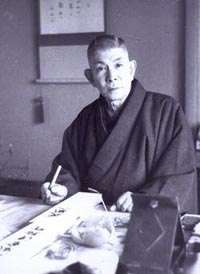Nakamura Tempu
| Nakamura Tempū | |
|---|---|
 | |
| Born |
July 20, 1876 Japan |
| Died |
December 1, 1968 (aged 92) Japan |
| Nationality |
|
| Occupation | Founder Shinshin-tōitsu-dō |
Nakamura Tempū (中村 天風, July 20, 1876–December 1, 1968) was a Japanese martial artist and founder of Japanese yoga. He was the first to bring yoga to Japan and founded his own art called Shinshin-tōitsu-dō (心身統一道 lit. way of mind and body unification[1]).
Biography
Early life and family background
Born in Tokyo, Japan, his original name was Saburō (Japanese: 三郎). He was the son of Nakamura Sukeoki (中村祐興 1829-1909) of Fukuoka Prefecture and Nakamura Teu (中村テウ 1858-1928) of Tokyo, known as Edo at the time. His father introduced the use of paper money in Japan when he served as the bureau director of the Japanese Ministry of Finance. Tempū Nakamura later moved to Fukuoka (福岡市, Fukuoka City), Fukuoka Prefecture (福岡県) to live with a relative. Once there, he took private lessons from an Englishman and enrolled in the Shūyūkan (Japanese: 修猷館, now Fukuoka Prefectural Shuyukan Senior High School in Sawara-ku) school where English was the medium of instruction and where he became proficient in his family's style of judo (随変流) and also trained in kenjutsu and iaijutsu. During judo practice, he totally defeated an opponent from Kumamoto who then tried to kill Nakamura in revenge. In the violent encounter, Nakamura stabbed and killed his assailant, which was ruled legitimate self-defence. He left the school and joined Gen'yōsha ultra-nationalist secret society, forming a friendship with Tōyama Mitsuru.
In the Imperial Japanese military

At the age of 16, he joined the Imperial Japanese Army and served as a covert agent in Northern China. China was reigned by the Manchu dynasty at that time. He was one of only nine out of 113 military affairs investigators to return to Japan alive from the Russo-Japanese War, after which he suffered a severe attack of tuberculosis at the age of 30.
Seeking a cure for his illness
Seeking a cure for the illness, he studied the autonomic nerves at Columbia University, and traveled to England, Germany, Belgium and France. For a period of time he lived with the family of Sarah Bernhardt. In 1911, on his way back to Japan, he met an Indian yogi in Egypt named Kaliapa (a.k.a. Cariapa and Kariappa), who took him to Gorkhe, in eastern Nepal. He remained there for two and a half years of yoga study and practice, which incidentally cured his illness. He practiced a variation of Raja Yoga and Karma Yoga with Kaliapa, with an emphasis on Raja Yoga.
Return to Japan

After finally returning to Japan, he served as president of Tokyo Industrial Bank, among other business activities. He established his own medical and philosophical organization, renaming it Tempūkai (Japanese: 天風会) in 1940. He taught Shin Shin Tōitsu-dō to Tōhei Kōichi, who later founded Shinshin-tōitsu-aikidō.
In Japan, Tempū was a prolific writer on philosophy and entrepreneurship.
Published works
Published works by Tempū Nakamura include these Japanese titles:
- ISBN 4-930838-55-X 成功の実現 (The Realisation of Success)
- ISBN 4-930838-59-2 盛大な人生 (A Prosperous Life)
- ISBN 4-930838-80-0 心に成功の炎を (Setting Fire to the Heart for Success)
- ISBN 4-06-263739-1 運命を拓く (Altering Fate)
- ISBN 4-06-208263-2 叡智のひびき-天風哲人箴言註釈 (Resounding Wisdom - the Annotated Maxims of Philosopher Tempū)
- ISBN 4-06-207695-0 真理のひびき-天風哲人新箴言註釈 (Resounding Truth - the Annotated Maxims of Philosopher Tempū)
- ISBN 4-930838-97-5 いつまでも若々しく生きる (Living Youthfully)
- ISBN 4-89101-020-7 君に成功を贈る (Building Your Success)
People who studied under Tempu
- Uno Chiyo author
- Tōgō Heihachirō the 'Admiral Nelson of the East'
- Hara Takashi the 19th Prime Minister of Japan
- Matsushita Kōnosuke the founder of Matsushita Electric
- Tōhei Kōichi founder of Ki-Aikido
- Tada Hiroshi Aikikai Aikido[2]
- Ozaki Yukio politician
- Inamori Kazuo founder of Kyocera Corporation
- Hirooka Tatsurō baseball player
References
- (Japanese) Seitai Kyokai translation
- The Life of Nakamura Tempu article (archived)
- Nakamura Tempu and the Origins of Japanese Yoga by H. E. Davey
- The Nakamura Tempū Story part I and II
External Links
|